
Wakelet collection on 3D printing resources
- Subject:
- Educational Technology
- Professional Learning
- Material Type:
- Lecture Notes
- Provider:
- Utah Coalition for Educational Technology
- Date Added:
- 03/13/2023

Wakelet collection on 3D printing resources

This slide deck has background on the five components of health-related fitness.
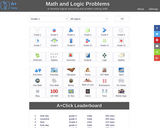
A+ Click is an interactive collection of more than 3700 math problems and answers for K-1 K-12 school program. It defines the personal level of math knowledge. You move up into the next level if you give 5 correct answers in a row. Practice makes perfect.
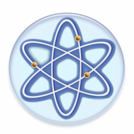
Introduce students to atoms with an engaging Google Slides and Cornell Notes activity. Image: jayofboy - https://www.freeimages.com/photo/atom-1307057

This collection from NRICH provides activities to help learners think and work like a mathematician. Tasks have students exploring, questioning, working systematically, visualizing, conjecturing, explaining, generalizing and justifying. Activities are organized under specific strategies and processes.

This collection from NRICH provides activities to help learners think and work like a mathematician. Tasks have students exploring, questioning, working systematically, visualizing, conjecturing, explaining, generalizing and justifying. Activities are listed under strategies and processes.
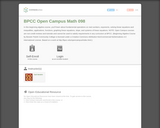
In this beginning algebra course, you'll learn about fundamental operations on real numbers, exponents, solving linear equations and inequalities, applications, functions, graphing linear equations, slope, and systems of linear equations. This course was created by Bossier Parish Community College as part of its MOOC series "Open Campus." NOTE: Open Campus courses are non-credit reviews and tutorials and cannot be used to satisfy requirements in any curriculum at BPCC. (Beginning Algebra Course by Bossier Parish Community College is licensed under a Creative Commons Attribution-NonCommercial-NoDerivatives 4.0 International License. Based on a work at http://bpcc.edu/opencampus/index.html.)
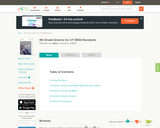
Table of Contents
1.0 Using This Book
2.0 Strand 1: Structure and Motion Within the Solar System
3.0 Strand 2: Energy and Matter
4.0 Strand 3: Weather Patterns
5.0 Strand 4: Ecosystems

This Geometry Concept Collection is a rigorous presentation of high school geometry. It is fully correlated with the Common Core State Standards.

This contemporary calculus course is the third in a three-part sequence. In this course students continue to explore the concepts, applications, and techniques of Calculus - the mathematics of change. Calculus has wide-spread application in science, economics and engineering, and is a foundation college course for further work in these areas. This is a required class for most science and mathematics majors.Login: guest_oclPassword: ocl

This contemporary calculus course is the second in a three-part sequence. In this course students continue to explore the concepts, applications, and techniques of Calculus - the mathematics of change. Calculus has wide-spread application in science, economics and engineering, and is a foundation college course for further work in these areas. This is a required class for most science and mathematics majors.Login: guest_oclPassword: ocl
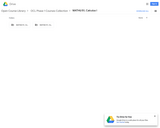
This course is an introduction to contemporary calculus and is the first of a three-part sequence. In this course students explore the concepts, applications, and techniques of Calculus - the mathematics of change. Calculus has wide-spread application in science, economics and engineering, and is a foundation college course for further work in these areas. This is a required class for most science and mathematics majors.Login: guest_oclPassword: ocl

This is a link to a UCET 2024 presentation. In this will be links to all our resources related to coaching teams with a hint of tech.
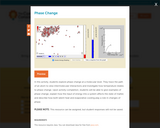
This interactive activity for grades 8-12 features eight models that explore atomic arrangements for gases, solids, and liquids. Highlight an atom and view its trajectory to see how the motion differs in each of the three primary phases. As the lesson progresses, students observe and manipulate differences in attractions among atoms in each state and experiment with adding energy to produce state changes. More advanced students can explore models of latent heat and evaporative cooling. This item is part of the Concord Consortium, a nonprofit research and development organization dedicated to transforming education through technology.

Links and instructions

This slide deck showcases what we're doing in Cache County School District to break down the barriers between our DTL Building Specialists and teachers.

Google Slides presentation for my talk.
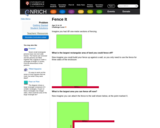
This series of problems requires students to apply their knowledge of area and perimeter to find the optimal area given a specified amount of fencing. The problems progress in difficulty as new elements are added to the situation, therefore changing the outcome. This page includes tips for getting started, solution, teachers resource page, and a printable problem page.

Slides from my presentation on the Finch robot.
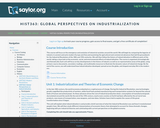
This course will focus on the emergence and evolution of industrial societies around the world. The student will begin by comparing the legacies of industry in ancient and early modern Europe and Asia and examining the agricultural and commercial advances that laid the groundwork for the Industrial Revolution. The student will then follow the history of industrialization in different parts of the world, taking a close look at the economic, social, and environmental effects of industrialization. This course ultimately examines how industrialization developed, spread across the globe, and shaped everyday life in the modern era. Upon successful completion of this course, students will be able to: identify key ideas and events in the history of industrialization; identify connections between the development of capitalism and the development of modern industry; use analytical tools to evaluate the factors contributing to industrial change in different societies; identify the consequences of industrialization in the 19th and 20th centuries in different societies; critique historical interpretations of the causes and effects of industrialization; and analyze and interpret primary source documents describing the process of industrialization and life in industrial societies. (History 363)